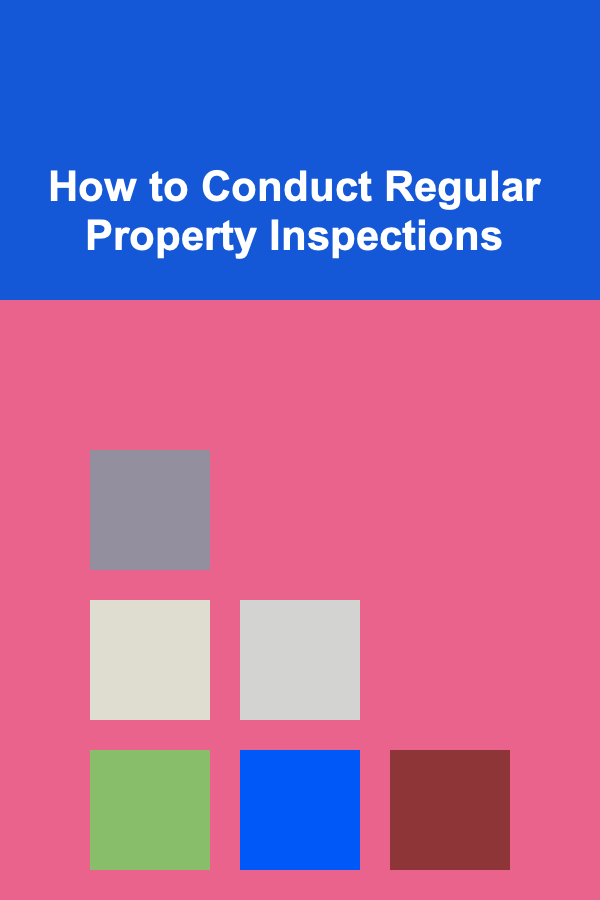
How to Conduct Regular Property Inspections
ebook include PDF & Audio bundle (Micro Guide)
$12.99$7.99
Limited Time Offer! Order within the next:

Regular property inspections are a vital part of effective property management, whether you're a landlord, property manager, or homeowner. They help maintain the property's condition, identify potential issues early, ensure compliance with tenancy agreements, and foster good relationships between landlords and tenants. This comprehensive guide outlines how to conduct regular property inspections effectively, covering everything from preparation to follow-up actions.
Understanding the Importance of Regular Inspections
1. Maintaining Property Value
Regular inspections help preserve the asset's value by identifying maintenance needs before they escalate into costly repairs. Neglected issues can lead to structural damage, which may significantly decrease the property's market value.
2. Ensuring Tenant Satisfaction
Conducting inspections shows tenants that you care about their living conditions and well-being. When tenants feel valued, they are more likely to renew their leases and treat the property responsibly.
3. Compliance with Legal Requirements
In many jurisdictions, landlords have legal obligations to maintain their properties in habitable conditions. Regular inspections can help ensure compliance with these regulations, reducing the risk of tenant disputes and legal complications.
4. Early Detection of Issues
Detecting problems early can prevent minor repairs from becoming major headaches. For example, identifying a small leak can save significant costs associated with water damage and mold remediation later on.
Preparing for Property Inspections
1. Establishing Inspection Frequency
Determining how often to conduct inspections depends on various factors, including:
- Type of Property: Different property types (e.g., single-family homes vs. multi-family units) may require different inspection schedules.
- Tenant History: New tenants may warrant more frequent inspections until their reliability is established.
- Local Laws: Some regions have specific regulations regarding the frequency and notice required for inspections.
Generally, conducting inspections every six months to a year is advisable.
2. Creating an Inspection Checklist
A thorough inspection checklist will serve as a roadmap for your inspections, ensuring no areas are overlooked. Your checklist should include:
a. Exterior Inspection Items
- Roof condition
- Gutters and downspouts
- Siding and exterior walls
- Windows and doors
- Landscaping and drainage
- Driveway and walkways
b. Interior Inspection Items
- Walls, ceilings, and floors
- Plumbing fixtures (sinks, toilets, tubs)
- Electrical systems (outlets, light switches)
- Heating and cooling systems
- Appliances
- Safety features (smoke detectors, carbon monoxide detectors)
3. Notifying Tenants
a. Advance Notice
Notify tenants at least 24 to 48 hours before the scheduled inspection, depending on local laws and lease agreements. This courtesy allows them to prepare for your visit.
b. Clear Communication
Communicate the purpose of the inspection and what it will entail. Providing context helps reduce anxiety and fosters a positive landlord-tenant relationship.
Conducting the Inspection
1. Arrive Prepared
Bring necessary tools and materials to assist with the inspection:
- Inspection checklist
- Camera or smartphone for photos
- Measuring tape (for any necessary measurements)
- Flashlight (to check dark areas like basements or attics)
- Notepad or tablet for notes
2. Follow the Checklist
a. Systematic Approach
Follow your checklist methodically to ensure thoroughness. Start with exterior inspections before moving indoors, checking off items as you go.
b. Document Findings
Take detailed notes on the condition of each item. Be specific about any issues, noting their location and severity.
c. Use Photos
Photograph areas of concern for documentation. Visual evidence can be invaluable when discussing issues with tenants or planning repairs.
3. Engage with Tenants
a. Encourage Questions
Invite tenants to share their observations during the inspection. They may point out issues you might overlook or clarify concerns they have about the property.
b. Offer Guidance
If you notice issues that could affect tenants' comfort or safety, discuss potential solutions. Providing guidance reinforces that you care about their living environment.
Post-Inspection Follow-Up
1. Analyzing Findings
a. Prioritize Repairs
Review your notes and photographs to prioritize repairs based on urgency and impact. Evaluate which issues need immediate attention and which can wait.
b. Budgeting for Repairs
Estimate the costs associated with repairs and allocate funds accordingly. If necessary, consult professionals for quotes on larger projects.
2. Communicating with Tenants
a. Provide Feedback
After the inspection, communicate your findings with tenants. Let them know what issues were discovered and how you plan to address them.
b. Set Timelines
If repairs are needed, set realistic timelines for completion. Keep tenants informed if there are delays or changes to the schedule.
3. Keeping Records
Maintain comprehensive records of all inspections, including:
- Inspection dates
- Notes on property conditions
- Photographs
- Correspondence with tenants
- Actions taken
These records provide valuable insights for future inspections and can be critical in case of disputes.
Best Practices for Effective Inspections
1. Be Professional
Approach each inspection with professionalism and respect. Being courteous and friendly fosters a positive atmosphere and encourages tenants to cooperate.
2. Focus on Maintenance Education
Use inspections as an opportunity to educate tenants about property maintenance. Share tips for caring for appliances, maintaining cleanliness, and recognizing signs of wear and tear.
3. Stay Consistent
Consistency in conducting inspections builds trust among tenants. Stick to the schedule you establish and communicate any necessary changes promptly.
4. Adapt to Tenant Needs
Recognize that not all tenants are the same. Tailor your approach based on individual tenant needs and preferences. Some may appreciate being involved in discussions, while others may prefer minimal interaction.
5. Build Strong Relationships
Foster positive relationships with tenants through transparency and open communication. A respectful landlord-tenant relationship can make inspections smoother and less stressful for everyone involved.
Common Challenges and Solutions
1. Tenant Resistance
Some tenants may view inspections as intrusive or unnecessary. To alleviate concerns:
- Clearly explain the purpose and benefits of inspections.
- Allow tenants to be present during the inspection.
2. Discovering Major Issues
Finding significant problems during an inspection can be daunting. When this occurs:
- Remain calm and objective.
- Discuss the issue openly with the tenant and outline the steps you will take to resolve it.
3. Poor Record-Keeping
Inadequate record-keeping can complicate inspections and property management. To improve this:
- Develop a streamlined system for documenting inspections and repairs.
- Utilize digital tools or apps designed for property management to keep records organized.
Leveraging Technology in Inspections
1. Inspection Apps
Consider using specialized inspection applications that allow for easier documentation and reporting. Many apps offer customizable checklists, photo storage, and automated reporting functionalities.
2. Digital Communication Tools
Utilize digital communication platforms to keep tenants informed about inspections and ongoing repair projects. Email and messaging apps can facilitate quick updates and enhance communication.
3. Virtual Inspections
In circumstances where in-person inspections may not be possible, consider virtual inspections. Using video calls, tenants can walk you through the property, pointing out areas of concern.
Conclusion
Conducting regular property inspections is a fundamental aspect of property management that ensures the safety, comfort, and satisfaction of tenants while preserving property value. By preparing thoroughly, communicating effectively, and following best practices, you can conduct inspections that benefit both you and your tenants.
Through proactive inspections, you not only mitigate risks associated with property neglect but also build strong, trustworthy relationships with your tenants. Ultimately, successful property management hinges upon consistent efforts to maintain high-quality living environments, and regular inspections are a cornerstone of that commitment. Embrace the process and continually refine your approach to create a sustainable and rewarding rental experience for all parties involved.
Reading More From Our Other Websites
- [Home Holiday Decoration 101] How to Create Unique DIY Christmas Ornaments with Simple Craft Supplies
- [Trail Running Tip 101] From Forest Paths to Inner Peace: The Wellness Benefits of Trail Running
- [Personal Care Tips 101] How to Choose Aftershave Based on Your Scent Preferences
- [Personal Care Tips 101] How to Choose an Eye Cream for Targeted Anti-Aging Benefits
- [Biking 101] How to Choose the Perfect Bike Basket for Your Needs
- [Home Space Saving 101] How to Maximize Space in a Small Bedroom with Smart Solutions
- [Skydiving Tip 101] Best Camera Mounts for Helmets to Record 360° Views During a 12‑Second Freefall
- [Home Storage Solution 101] How to Tidy Up Your Garage with Smart Storage Solutions
- [Home Family Activity 101] How to Organize Outdoor Activities for Family Bonding
- [Home Cleaning 101] How to Clean Your Oven Without Using Oven Cleaner

How to Budget and Plan for College Application Fees: An Actionable Guide
Read More
How to Declutter Your Dining Room Before Hosting Guests
Read More
How to Prevent Destructive Behavior in Pets at Home
Read More
How to Recover with Cold and Heat Therapy
Read More
How To Discover Novels Based on True Events
Read More
How to Develop AI for Sports Analytics
Read MoreOther Products

How to Budget and Plan for College Application Fees: An Actionable Guide
Read More
How to Declutter Your Dining Room Before Hosting Guests
Read More
How to Prevent Destructive Behavior in Pets at Home
Read More
How to Recover with Cold and Heat Therapy
Read More
How To Discover Novels Based on True Events
Read More